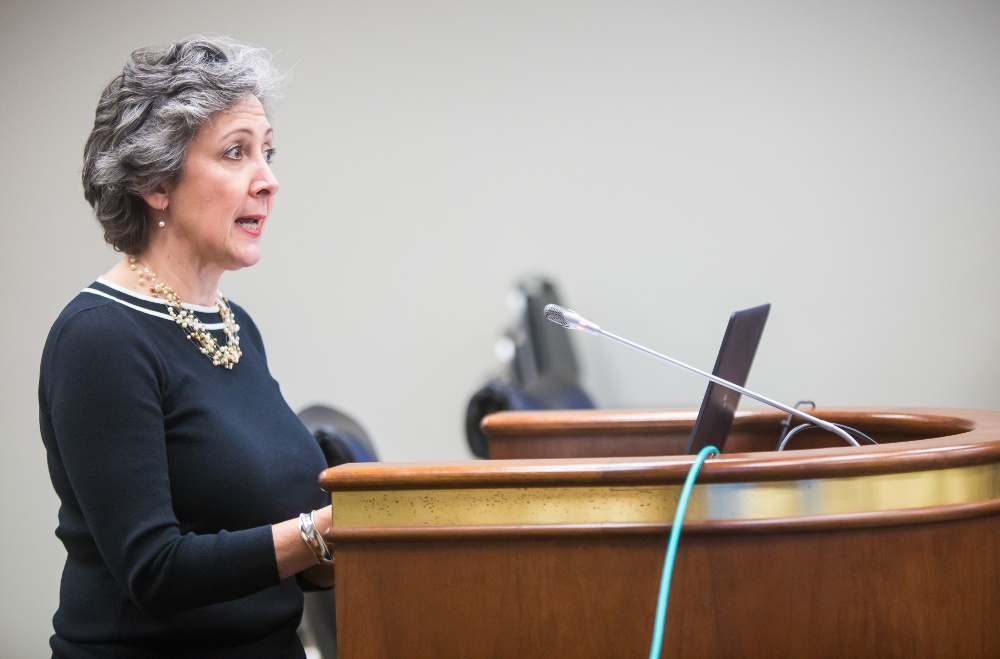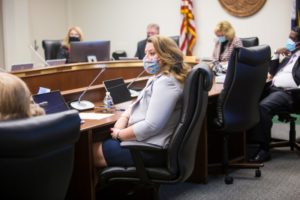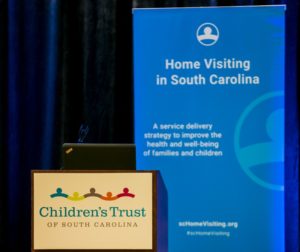As the S.C. Legislature conducts its current session, child welfare issues continue to be discussed. This story details how Children’s Trust plays a vital role in ensuring lawmakers have access to information and data related to children and families.

Children’s Trust CEO Sue Williams presents information on the child abuse prevention organization and its home visiting program to a House subcommittee.
Children’s Trust CEO Sue Williams delivered a strong message that spoke directly to her organization’s purpose in front of the S.C. House Education and Public Works Early Childhood Subcommittee.
Testifying Tuesday, Jan. 16 at the Blatt Building before the newly created subcommittee, which operates within the House Education and Public Works Committee, she emphasized the significance of the role that Children’s Trust plays in bettering the lives of children and families across South Carolina.
“Our mission is strengthening families, organizations and communities to prevent child abuse and neglect. Our vision is a South Carolina where every child thrives,” Williams said. “We lead and support a network that shares our belief that all children should thrive, live in secure families, and be surrounded by supportive communities.”

House Early Childhood Subcommittee members listen to a presentation by Sue Williams.
The Early Childhood Subcommittee is composed of Rep. Paula Calhoon (R-Lexington), the subcommittee chair; Rep. Jerry Govan (D-Orangeburg); and Rep. Melissa Oremus (R-Aiken). Also in attendance were Rep. Rita Alison (R-Spartanburg), chair of the Education and Public Works Committee, and Rep. Lin Bennett (R-Charleston), first vice chair. The meeting can be viewed on the S.C. Legislature’s video archive webpage.
Rep. Calhoon reiterated the subcommittee’s commitment to its work supporting South Carolina’s children during her opening remarks and introduction of Williams.
“Early childhood is our hearts,” Calhoon said. “We know we need to have those resources. We need to have communication.”
The subcommittee was created to recommend the best structure for coordinated early childhood services provided to children from birth to age 5 for the purpose of improving the delivery of services, maximizing the number of children served, ensuring that all children are ready to enter school, and delivering cohesive high-quality early childhood education, care and parental support to all children in South Carolina.
Williams detailed the four primary areas of Children’s Trust: supporting evidence-based programs; providing funding and resources; building statewide and community coalitions; and leading prevention training for child-serving professionals.
“We take a two-generation approach to our work, ensuring the child and the parents have what they need to succeed,” Williams said.
Williams explained the state currently ranks No. 41 nationally in child health and well-being as measured by the Annie E. Casey Foundation’s KIDS COUNT Data Book through the four domains of economic, education, health, and family and community.

Children’s Trust hosts a biennial Home Visiting Summit that brings together home visitors like social workers, nurses and child development specialists.
She also detailed the organization’s evidence-based child abuse prevention programs, with a focus on the Maternal, Infant and Early Childhood Home Visiting (MIECHV) program and how the federally-funded initiative provides support to improve maternal and child health, encourage positive parenting, and promote child development and school readiness. Children’s Trust supports three home visiting models – Healthy Families America, Nurse-Family Partnership, and Parents as Teachers – in partnership with 16 implementing agencies covering 40 counties.
Williams gave an update on a recent needs assessment of the program.
“Home visiting is widely available and provides invaluable supports for families,” she said. “The infrastructure and capacity have expanded over the last 10 years as a result of the MIECHV program funding. Home visiting in South Carolina does meet the needs of families that can access the services.”
However, she noted the assessment also showed the needs for stronger coordination for family referrals; new ways to increase family engagement in rural areas; stronger infrastructure in the areas of transportation, child care and mental health services; and more staff members representing minority and bilingual populations.
During questioning from subcommittee members, the importance of raising awareness about home visiting and getting additional funding to expand the program was also discussed.
Rep. Calhoon thanked Williams for her presentation at the close of testimony.




